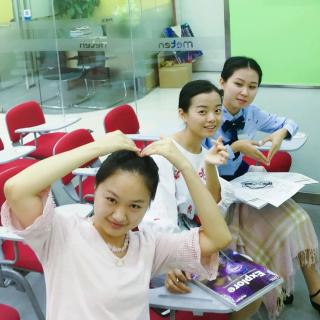
介绍:
【EM2-LP2 Countries – B It’s a big city】 Meten, LH Center, SZ, LT: Yoga Yu
亲爱的听众朋友们大家好,这里是Yoga的荔枝电台,FM799839,我是美联深圳龙华中心的LT Yoga,在这里为大家播讲新M2的LP2B:It’s a big city的课程,欢迎您的收听,希望通过我们的节目,你能够对本课有更好的预习和复习,让我们开始学习吧!
Unit Goals of Unit 2B: 教学目标:
(1)Identify adjectives and nouns;识别形容词和名词;(2)Describe a city; 描述一个城市;
【Words and phrases: 单词和短语:】
(1)课文中的单词和短语:fun facts有趣的事实; Rio de Janeiro=Rio里约热内卢;
Brazil n 巴西; million n 百万,nickname n 昵称, beach-beaches 海滩(复数+es),nightlife n 夜生活, its, 它的(物主代词possecive pronoun);be famous for 因为什么而著名;carnival n 嘉年华;street n 街; from all over Brazil来自整个巴西; all over the world全世界; popular place有名的地方; play soccer踢足球; meter米, feet英尺, 396 meters tall 396米长/高; wonderful adj 很棒的; view n 视野; interesting adj 有趣的; visit v 参观;Khaju Bridge哈鸠桥, Isfahan/,isfə'ha:n/ 伊斯法罕,伊朗城市;The Grand Bazaar 大巴扎、大市场;Iran n 伊朗;Iraq n 伊拉克;Saudi Arabia 沙特·阿拉伯;UAE(United Arab Emirates) 阿联酋;Oman 阿曼;Iranians 伊朗人; the main square 主广场; Melissa玛丽莎;Sydney悉尼;on vacation 度假;penguin n企鹅; Table Mountain 桌状山、平顶山;Boulders Beach 博尔德斯海滩/企鹅海滩;CapeTown 开普敦;South Africa南非;hiker 徒步者; Scotland 苏格兰;
(2)形容词:marvelous adj 了不起的,非凡的,large adj 大的,old老的,旧的, beautiful adj 美丽的,ugly adj 丑陋的;exciting adj 令人兴奋的,friendly adj 友好的,unfriendly adj ;不友好的;crowded adj 拥挤的,capacious adj宽敞的;boring adj 无聊的;dull adj 乏味的;expensive adj 昂贵的;cheap adj 便宜的;quiet adj 安静的; noisy adj 吵闹的;relaxing adj 让人放松的;traditional adj 传统的;modern adj 现代的;polluted adj 污染了的;clean adj 干净的;
(3)其他词汇:make prediction 预测; listen for details 听细节;compare 比较;scan for information 浏览找信息;follow the steps blow依据下列的步骤;circle the key words;圈出重点单词; write your guess 写出你的猜测;at the bottom of next page 在下一页的底端; True or false 正确还是错误;
【Sentences: 句子;】
(1)提问城市的句子:
—Is your city big or small?你的城市是大还是小呢?—It is very big.它非常大。
—Is it interesting?它有意思吗?—Yes,It is very interesting.是的,很有趣。
—Are the people friendly?人们和善吗?—Yes, people there are friendly.是的,那里的人们很友好。
—Are the streets crowded?街道拥挤吗?—Yes, the streets are very crowded on weekends.是的,在周末的时候,街道是很拥挤的。
—What is the city famous for?它是因为什么而著称呢?—The city is famous for it’s good scenery.这城市因为它的美景著称。
—What is your favorite place in your city, why? 在你的城市中你最喜欢哪个地方?—My favorite place in the city is the beach, because it’s very peaceful there. 我最喜欢这个城市的海滩,因为那里很平静。
(2)和be动词连用的表示城市的句子:
—Is my city beautiful?我的城市漂亮吗?
— Yes, it is,your city is beautiful.是的,你的城市很漂亮。
—Are the buildings new? 这些建筑物是新的吗?
— No, the buildings are old. 不,这些建筑很旧了。
—Is it a boring city? 它是一个无趣的城市吗?
—No, it isn’t , it is an exciting city. 不,它不是,它是一个令人激动的城市。
—Are there any tall buildings? 这里有一些高的建筑吗?
— No,there aren’t any high rise buildings,there are many low rise buildings.
不,这里没有高层建筑物,这里有很多低矮的建筑物。
【Article 文章】关于景点的信件;
Hi Cary,你好,卡里,
Greetings! It’s day six of my vacation. I’m in a big city of 3.75 million people. It’s very exciting.
你好呀! 今天是我的假期的第六天。我正身处于一个有着360万人口的大城市, 它非常令人激动。
Right now I’m in a busy café on Long Street. There are a lot of restaurants and shops on Long Street. The streets are very crowded!现在我正在长街上的一家忙碌的咖啡厅里,这里有很多的餐馆和商店在长街上,街道非常拥挤。
There are a lot of interesting things to see and do here. Boulders Beach is beautiful. It’s famous for penguins!这里有很多有趣的事情可以去看去做,博尔德斯海滩很漂亮,它因企鹅而著称。
There’s also Table Mountain. It’s a popular place. The view from there is really wonderful.这里还有桌状山,它是个很受欢迎的地方。那里的风景真的非常棒。
There are a lot of World Cup soccer stadiums here. Do you like soccer? I don’t!这里有很多世界杯的足球体育馆,你喜欢足球吗? 我不喜欢!
I’m having a great time! Please say “Hi” to everyone in Sydney for me!我正玩得开心呢,请记得向悉尼的各位问好!
Melissa玛丽莎
4.【Grammar】: be动词的一般现在时,be动词的现在式有am,is,are三种;
(1) be动词的肯定句: 句型:主语 + be动词...
be动词的肯定句由“主语 + be动词(am/is/are) + 表语”构成:
I am a doctor.我是一名医生。Mary is at work.玛丽在工作。
He is very brilliant.他非常聪明。It is a nice day.今天天气晴朗。
You are my only friend.你是我惟一的朋友。They are students.他们是学生。
(2)be动词的否定句: 句型:主语 + be动词(am/is/are) + not...
be动词一般现在时的否定句结构,是在be动词am,is,are之后加not:
We aren't her classmates.我们不是她的同班同学。
I'm not Tom.我不是汤姆。(I'm是I am的缩写,读作/aim/。)
(3)be动词的一般疑问句:句型:be动词 + 主语...?
回答方式:Yes,主语 + be动词(am/is/are)...
No,主语 + be动词(am/is/are) + not...
be动词的一般疑问句是将be动词置于主语之前(大写am/is/are的第一个字母),在句尾加问号;这种语序是主语和谓语倒装语序:
肯定句:They are fruits.它们是水果。
疑问句:Are they fruits? 它们是水果吗? (主语和谓语倒装)
肯定句:The book is on the table.书在桌子上。(主语和谓语倒装)
疑问句:Is the book on the table? 书是在桌子上吗?
回答由be动词构成的疑问句时,肯定要用Yes,否定用No:
Are you John's brother? —Yes,I am.你是约翰的兄弟吗? ——是的,我是。
-Are Mary and John still at school? —No,they are not.
玛丽和约翰仍在学校吗? ——不,不在了。
Are you there? 喂,你听着吗? (打电话时用)
(5)be动词的特殊疑问句;
句型:疑问代词(主语) + be动词(am/is/are)...?
疑问代词/疑问副词 + be动词(am/is/are) + 主语...?
who“谁”:Who is there? 谁在那里? (就主语提问)Who is she? —She is my mother. 她是谁? ——她是我母亲。(就表语提问)
what(指某一或某种未知的事物或人)“什么”:What is Susan like? 苏珊是什么样的人? /苏珊的人品如何? (就介词宾语提问)
whose“谁的”:Whose house is this? —The house is Jane's.这是谁的房子? ——是简的房子。
which“哪一个、哪一些”:Which of these books is yours? 这些书中哪一本是你的?
where“在哪里”:Where is he? —He's upstairs/at home/in the office.他在哪里? ——他在楼上/在家里/在办公室。
how“怎样、如何”:
How is Helen? —She is very well,thank you.海伦好吗? ——她很好,谢谢您。
大家还在听

